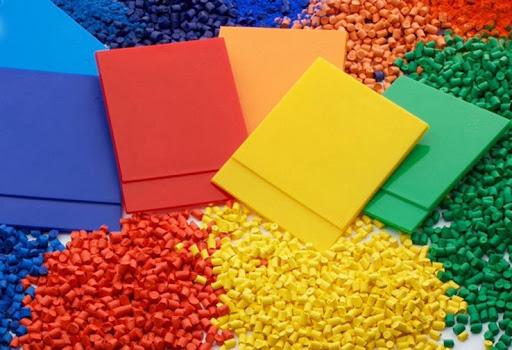
by Kandui Industries Pvt. Ltd. | Feb 17, 2025 | Masterbatches
Introduction:
Polyester masterbatches are a class of versatile additives that have gained significant popularity in the plastic industry. These masterbatches are specifically designed to enhance the performance and appearance of polyester-based plastics, making them a preferred choice for a wide range of applications. In this blog, we will provide a comprehensive introduction to polyester masterbatches, exploring their properties, benefits, and various applications in the modern world of plastic manufacturing.
Understanding Polyester Masterbatches:
Polyester masterbatches are concentrated blends of pigments, additives, and carriers that are compatible with polyester resins. They are typically in pellet form and are added to the base polymer during the plastic processing stage. These masterbatches serve as a convenient way to introduce colour, improve processing, and impart specific properties to the final polyester product.
Properties of Polyester Masterbatches:
a. Colour Enhancement:
One of the primary functions of polyester masterbatches is to add vibrant and consistent colours to polyester plastics. Manufacturers can choose from an extensive palette of colours, allowing for customization and branding of their products.
b. UV Stability:
Polyester masterbatches can be formulated to provide UV stability, protecting the end-products from the harmful effects of prolonged exposure to sunlight and ensuring the longevity of the plastic materials.
c. Flame Retardancy:
By incorporating flame retardant additives into polyester masterbatches, manufacturers can significantly enhance the fire resistance of polyester-based products, making them safer for various applications.
d. Anti-Static and Anti-Fog Properties:
Polyester masterbatches can be tailored to provide anti-static properties, preventing the build-up of static charge on the plastic surface. Additionally, they can offer anti-fog properties, making them ideal for applications in the food packaging industry.
Applications of Polyester Masterbatches:
a. Packaging Industry:
Polyester masterbatches find extensive use in the packaging industry. They are commonly employed in the production of polyester films, which are widely used for flexible packaging, labels, and wrapping applications.
b. Textiles:
Polyester is a popular material in the textile industry due to its excellent properties such as durability, wrinkle resistance, and ease of maintenance. Masterbatches are used to add colour and impart specific functionalities to polyester fibres and fabrics.
c. Automotive:
Polyester masterbatches play a significant role in automotive applications, particularly in the production of various interior and exterior components. They help achieve desired colours, UV stability, and flame retardancy for automotive parts.
d. Electrical and Electronics:
Polyester masterbatches are utilized in the manufacturing of electrical components, such as connectors and insulating materials, where colour consistency and flame retardancy are essential.
e. Construction:
In the construction sector, polyester masterbatches are used for producing plastic materials like roofing sheets, pipes, and fittings, where UV stability and weather resistance are critical factors.
Conclusion:
Polyester masterbatches have become indispensable in the world of plastic manufacturing, offering a wide range of properties and benefits that enhance the performance and aesthetics of polyester-based products. From adding vibrant colours to providing UV stability and flame retardancy, these versatile additives find applications in diverse industries such as packaging, textiles, automotive, electrical, electronics, and construction. Manufacturers can harness the potential of polyester masterbatches to create innovative and high-quality products that meet the ever-evolving demands of the modern market.

by Kandui Industries Pvt. Ltd. | Feb 10, 2025 | Masterbatches
Introduction:
In the quest for sustainable practices and eco-friendly solutions, the plastic industry faces the challenge of minimizing its environmental impact without compromising product quality. Enter Universal Masterbatches – a revolutionary approach that offers a sustainable solution to plastic manufacturing. In this blog, we will delve into the concept of Universal Masterbatches and explore how they contribute to a greener future while maintaining the versatility and performance that the plastic industry demands.
Understanding Universal Masterbatches:
Universal Masterbatches are innovative additives that have gained momentum in the plastic manufacturing industry. Unlike traditional masterbatches, which are tailored to specific plastic resins, Universal Masterbatches are designed to be compatible with a wide range of polymers. This versatility allows manufacturers to streamline their production processes and reduce the number of different masterbatch formulations, ultimately leading to a more sustainable approach.
Simplified Inventory Management:
With Universal Masterbatches, manufacturers can simplify their inventory management significantly. Instead of stocking multiple specialized masterbatches for different plastic resins, they can now use a single Universal Masterbatch that works across various materials. This not only reduces warehousing requirements but also minimizes the risk of inventory waste, creating a more efficient and cost-effective supply chain.
Reduced Energy Consumption:
Universal Masterbatches contribute to sustainability by promoting energy efficiency during the manufacturing process. As they are compatible with multiple plastic resins, manufacturers can optimize their processing conditions, reducing the energy required for adjusting machines and creating products. The result is a notable reduction in greenhouse gas emissions and overall energy consumption.
Minimized Plastic Waste:
Plastic waste is a pressing environmental concern. Universal Masterbatches play a vital role in minimizing plastic waste by allowing manufacturers to use a single masterbatch for multiple applications and plastic types. This means that leftover masterbatch can be used in different productions, reducing material wastage and enhancing resource utilization.
Transition to Recycled Plastics:
The use of Universal Masterbatches also facilitates the transition to recycled plastics. As the masterbatches can be applied to different types of recycled plastic resins, manufacturers can incorporate higher percentages of recycled content into their products without compromising quality or consistency. This promotes a circular economy and reduces the demand for virgin plastics.
Meeting Sustainability Goals:
Many industries are setting ambitious sustainability goals to reduce their environmental footprint. Universal Masterbatches provide an effective solution for plastic manufacturers to align with these goals. By adopting sustainable practices and eco-friendly products, manufacturers can enhance their brand reputation, attract environmentally conscious consumers, and contribute positively to a greener future.
Conclusion:
Universal Masterbatches represent a significant step forward in the pursuit of sustainable plastic manufacturing. By offering compatibility with a wide range of plastic resins, these innovative additives streamline production processes, reduce energy consumption, minimize plastic waste, and enable the use of recycled materials. Embracing Universal Masterbatches allows manufacturers to take a giant leap towards a more sustainable and environmentally responsible future while maintaining the performance and versatility that the plastic industry demands. As the demand for eco-friendly products continues to grow, Universal Masterbatches offer a game-changing solution to create a greener and more sustainable world.

by Kandui Industries Pvt. Ltd. | Jan 20, 2025 | Color Masterbatch, Masterbatches
Colour masterbatches, also known as colour concentrates, are additives used in the plastics industry to provide specific colours to plastic products. They are concentrated mixtures of pigments or dyes dispersed in a carrier resin.
Colour masterbatches are widely used in various plastic applications to achieve desired colours in products such as films, sheets, bottles, containers, toys, and many other plastic items. They offer a convenient way to incorporate colour into plastic formulations without the need for extensive colour mixing or direct addition of pigments.
The masterbatch is typically added to the base polymer during the manufacturing process. It is mixed with the base resin to achieve the desired colour and opacity. The concentration of the colour masterbatch added depends on the desired intensity of the colour and the transparency of the final product. Different grades and concentrations of colour masterbatches are available to meet specific application requirements.
Colour masterbatches offer several advantages, including consistent colour reproduction, improved dispersion of pigments, ease of handling and storage, and flexibility in adjusting the colour intensity. They also allow manufacturers to achieve a wide range of colours by using different combinations of pigments or dyes.
It’s important to note that colour masterbatches are available in various types and formulations, each suitable for different plastic materials and processing conditions. Manufacturers often provide a range of standard colours, but custom colour matching is also possible to meet specific colour requirements.
Overall, colour masterbatches play a crucial role in the plastic industry by providing an efficient and cost-effective solution to achieve consistent and vibrant colours in plastic products.

by Kandui Industries Pvt. Ltd. | Mar 17, 2024 | Color Masterbatch, Masterbatches
Choosing the right black masterbatch depends on several factors related to the end-use application, performance requirements, and cost considerations. Here’s a guide to help you make the best choice:
1. Application Requirements
- Type of Polymer: Black masterbatches are specific to the type of polymer you’re processing, such as PP, PE, PET, ABS, etc. Ensure that the black masterbatch is compatible with the polymer used in your product.
- End Use: Determine whether the application is for outdoor or indoor use. Outdoor applications may require UV-stabilized black masterbatch to prevent fading or degradation due to sunlight exposure.
- Regulatory Requirements: If your product comes into contact with food or medical equipment, ensure the masterbatch complies with relevant regulations (FDA, EU food contact standards, etc.).
2. Carbon Black Content and Type
- Carbon Black Grade: Different grades of carbon black offer different levels of dispersion, opacity, and gloss. For example:
- High Jetness (High Tint): Provides a deep, rich black color but may cost more.
- General-Purpose Grades: More cost-effective but with lower performance for appearance-focused applications.
- Loading Level: A higher carbon black loading (15–50%) provides greater opacity, but it’s important to balance this with cost and processing conditions.
3. Dispersion Quality
- Uniform Dispersion: For applications where aesthetics and surface quality are critical (such as films or molded parts), choose a masterbatch with excellent dispersion characteristics to avoid streaking or poor color uniformity.
- Filler Content: Some masterbatches may contain fillers (such as calcium carbonate) that can affect properties like gloss, mechanical strength, and appearance. Ensure that these fillers align with your product requirements.
4. UV Resistance
- For outdoor applications, UV stability is crucial. Some black masterbatches come with UV stabilizers to protect the product from degradation due to prolonged sun exposure.
5. Processing Conditions
- Ensure that the black masterbatch can withstand the temperature range of your process. For instance, high-temperature applications (e.g., extrusion or injection molding) require a masterbatch that doesn’t degrade under heat.
6. Cost Considerations
- Price vs. Performance: Balance the cost of the masterbatch with the performance characteristics you need. Higher jetness and UV stability often come at a premium, so optimize based on the value it provides to your product.
- Dilution Ratio: Calculate the required dilution ratio for your polymer to avoid overusing masterbatch, which can lead to higher costs.
7. Sustainability & Additives
- Look for black masterbatches that align with any sustainability goals you may have. Some black masterbatches are made with recycled carbon black, which could contribute to an eco-friendly solution.
- Additives like antioxidants or thermal stabilizers may be necessary for certain products to ensure long-term durability.
By considering these factors, you’ll be better equipped to select the most suitable black masterbatch for your application.





